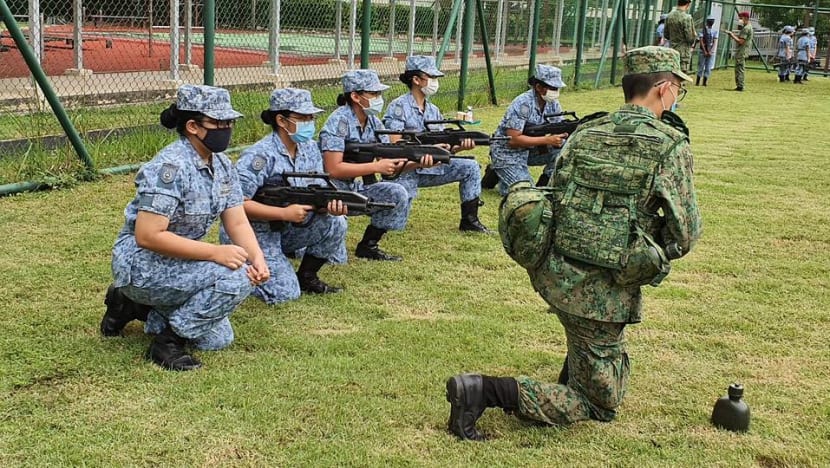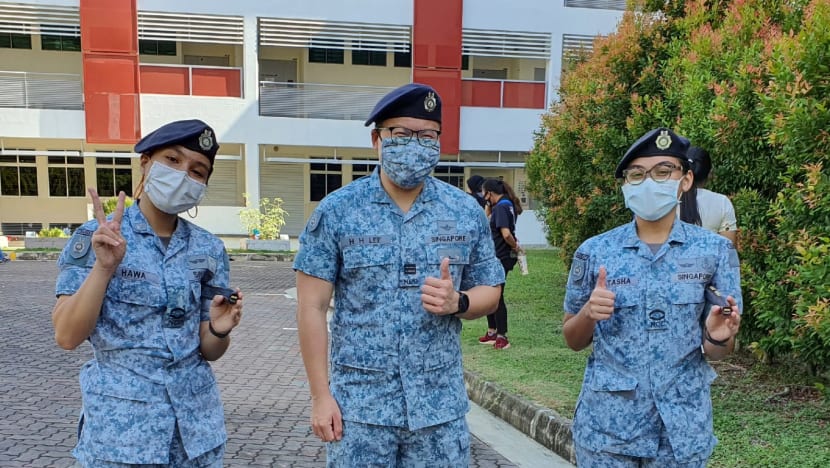‘Definitely a loss' when students miss out on in-person CCAs, but COVID-19 could bring opportunities: Experts

Secondary 3 student Nur Natasha Mohamed Riduwan (third from left) practising drills with her CCA mates. (Photo: Changkat Changi Secondary School)
SINGAPORE: For 15-year-old Nur Natasha Mohamed Riduwan, school co-curricular activities (CCAs) look a little different these days.
Before the COVID-19 pandemic, the unit sergeant major of the National Cadet Corps Air (Girls) at Changkat Changi Secondary School would train alongside her schoolmates, coaching juniors in drills and physical training.
There were no masks in sight, and the 42 girls could intermingle freely. Once a year, a passing out parade would be held in conjunction with NCC Air (Boys), with about 100 students in attendance.
But with in-person CCAs suspended when students returned to school for Term 3 this year, Natasha and her peers started having online CCA sessions instead. The students practised drills, went through physical training and played icebreaker games on live Zoom sessions - together, but apart.
READ: Secondary schools, JCs may resume 'lower-risk' CCAs and other school activities: MOE
“We were actually able to interact and see each other, and also through the bonding games, we actually get to know each other even though we’re not physically there together," said Natasha, adding that she was initially "surprised" that CCAs could be conducted online.
It was not easy to supervise training sessions over Zoom. For instance, it was difficult to observe drills “via the small Zoom window”, said the Secondary 3 student. “It was actually challenging for us to correct their mistakes with verbal cues only.”
Experts CNA spoke to stressed that the benefits of face-to-face CCAs in school cannot be replicated online.
“There is a big difference. For example, (for) musical instruments or even drama, it’s very different to stage a Zoom performance than to stage a live performance ... It is not the same thing,” said Associate Professor Jason Tan of the National Institute of Education (NIE) Department of Policy and Leadership Studies.
“For sports, it is also definitely not the same thing to do sports training online. There’s only so much you can do with your coach online. You need that face-to-face interaction with your team members and your coach. So it’s been very tough for everyone this year.”
READ: Circuit breaker blues: How to help children cope with changes to routine
READ: Lego sushi, artificial snow, obstacle courses: Parents get creative during the COVID-19 circuit breaker
Adding that it will be “very tough” to replicate the experience online, Assoc Prof Tan also noted that while overseas trips and learning journeys could be conducted virtually, it is still “not quite the same thing”.
“Of course you have to ask yourself, what are you losing in terms of the authenticity of the experience? The whole point is to have that face-to-face human interaction. I don’t see a satisfactory solution to that problem right now,” he added.
Treating online activities as “distinctly new” would be better than “a wholesale conversion” from regular CCA activities, said head of psychological medicine at Khoo Teck Puat Hospital Dr Goh Kah Hong.
Noting that some activities are better suited to be held online than others, he said: “The element of in-person interaction is perhaps the hardest to replicate online. That is not to say that it is always impossible.”
The interpersonal dynamic in school has “changed dramatically” due to pandemic-related measures, Dr Goh said.
“Kids are not allowed to play during recess time, let alone participation in CCAs in large groups. Many out of class activities allow our students to be creative, to apply what they learnt, and also help develop social skills,” he said.
“It is definitely a loss when children are deprived of these opportunities.”
"REAL CONSEQUENCES" FROM LOSS OF CCA TIME
Children from less privileged families may lose out more from missing in-person CCA sessions, said Assoc Prof Tan. CCAs also give students a chance to mix with other students across levels, streams and subject bands.
“One thing that comes to mind immediately is the fact that not all homes are able to provide these sorts of experiences on a regular basis. So for some students, these school-organised CCAs or other activities are a major source of development outside of lesson time,” he said.
“For example music lessons and sports and so on, especially for parents who can’t afford to pay for lessons outside of school, the school (is) playing a very major role.”
Experts also noted that co-curricular activities are important because they give students a sense of accomplishment or confidence outside of the classroom, especially if they may not be experiencing this in their academic subjects.
“Specifically, for primary school students, extracurricular activities present opportunities beyond their academic curriculum to build up a child’s self-esteem and confidence when they become aware of the physical and cognitive abilities that they can achieve,” said clinical psychologist at KK Women’s and Children’s Hospital (KKH) Jerlyn Ang.
"Additionally, students hone problem-solving skills as they navigate through social situations to complete group tasks or activities. Secondary school students seeking out adolescence can also be enabled to explore their self-identity and sense of belonging through shared experience with their peers through goal-led extracurricular activities.”
Losing out on CCA time could also affect students who want to use their extracurricular experience in next year’s admission exercises or scholarship applications, said Assoc Prof Tan.
The Ministry of Education (MOE) had announced in May that direct school admission (DSA) exercises for students applying to secondary schools and junior colleges would continue.
READ: Direct School Admission applications to open May 12, selection process tweaked due to COVID-19
No physical trials or face-to-face interviews will be part of the DSA selection process, MOE had said, and students may be asked to perform simple tasks during e-interviews to demonstrate their potential in a specific talent area.
“We recognise that there might be limitations in assessing students via e-modes for certain talent areas, like team sports,” MOE had said at the time, noting that events like the National School Games and Singapore Youth Festival Arts Presentation cannot be used to assess students.
“(In interviews), they talk about leadership potential, about competitions, they talk about demonstrating experiences in the field of study that they’re applying for,” said Assoc Prof Tan.
“So this loss of CCA time has very real consequences, I think especially for next year’s admissions exercises.”
After MOE’s announcement that lower-risk CCAs would be allowed to resume from end-July, Natasha and her schoolmates shifted to a mix of online and offline sessions.

Even though they can now train together in person, the safe distancing measures in place mean that they still only train in groups of five, and cannot mingle with the other groups. Having to wear masks throughout training also poses a challenge, Natasha added.
Although training in small groups is “more time consuming”, she said: “Despite the challenges, I know that we understand the need for these measures to keep everyone, including our families safe. I'm actually grateful for the school for all the efforts to have these measures in place, and also to allow our CCA to continue for all of us.”
Responding to CNA queries, divisional director of the student development curriculum division at MOE Tan Chen Kee said CCAs play “a key role” in the holistic development of students.
Before face-to-face CCAs resumed, schools implemented a mix of online CCAs and class-based ones. For example, CCAs such as computer programming, art and robotics were adapted for online learning, Mrs Tan said.
“While these cannot replace face-to-face CCA sessions, schools have been able to tap on them to continue to provide learning opportunities for our students’ holistic development,” she added.
For activities that were more suitable to be conducted face-to-face, schools could implement them at the class level to minimise intermingling. This also meant students could try different CCAs that they otherwise might not have been exposed to, she added.
“We know that many students have missed participating in their CCAs, and students who were selected to participate in inter-school competitions were also understandably disappointed - particularly the graduating students,” said Mrs Tan.
“Nonetheless, we appreciate that students understood the need to suspend these activities and the importance of prioritising safety, no thanks to the COVID-19 situation.”
FINDING NEW OPPORTUNITIES
Despite the challenges, experts said there may be a silver lining in the move to conduct some portions of CCAs online.
Citing examples of CCA organisers uploading video lessons for students, KKH's Ms Ang noted that this can allow students to learn at their own time and pace.
“This can also allow more time and flexibility for students who are slower in attaining mastery of skills to practice repeatedly and catch up with their peers,” she added.
At Changkat Changi Secondary, the participation rate in online CCAs has been “relatively high”, and the responses from students were “very positive”, even though they were not compulsory, said the school’s head of department for Physical Education and CCAs Sim Chong Ghee.
He noted that when the school’s netball team spoke to a former national player over Zoom, students were observed to be “listening attentively and asking meaningful questions”, and were “deeply inspired” by the sharing session.
“Students were very satisfied with the learning and were engaged in the activities. And at the same time, most students indicated that they have missed having the CCAs conducted face-to-face, and they have also expressed their readiness to return to normal CCA sessions,” Mr Sim added.
“It will not be 100 per cent the same as what it used to be because of all the limitations in terms of the safe management measures and guidelines, but we are trying our best.”
On a broader level, the introduction of smaller groups in CCAs could also be applied to class sizes, said Dr Goh.
Class sizes in Singapore are “on the high side” compared to other developed nations, and it is now a good time to start planning for more intimate and smaller classes which will also help with physical distancing amid the pandemic, he added.
“The school curriculum has already been evolving, but generally the education system remains very content heavy. Perhaps we could infuse more elements of flexibility and creativity into the normal curriculum, allowing for emphasis on life skills rather than acquiring knowledge,” said Dr Goh.
“It is not easy to have a paradigm shift, but the current climate does call for one. This opportunity may just be the one to leapfrog our education into the future.”
The CNA Leadership Summit 2020: Navigating the Post-Pandemic World will discuss through a series of TV programmes and webinars how businesses and organisations have reacted to the pandemic and applied innovative practices.
More details are available at: cna.asia/leadership-summit.












